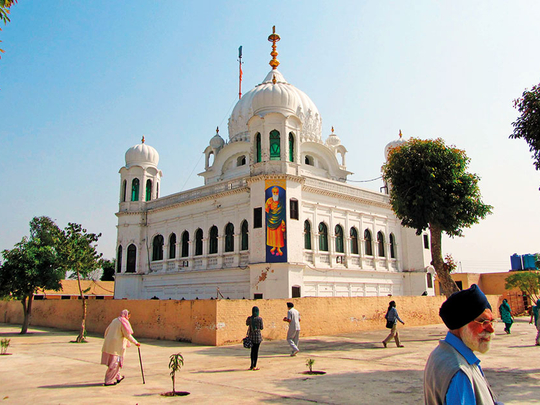
New Delhi/ Islamabad: The issue of Pakistan opening the Kartarpur Sahib gurdwara corridor will figure at the meeting between India’s External Affairs Minister Sushma Swaraj and Pakistan Foreign Minister Shah Mehmood Qureshi on the sidelines of the UN General Assembly (UNGA) session later this month, a senior Indian official said on Thursday.
Responding to a question at his weekly media briefing in New Delhi, India’s External Affairs Ministry spokesperson Raveesh Kumar said that food processing minister Harsimrat Kaur Badal had recently written to Sushma Swaraj seeking action on the Kartarpar corridor opening to which the latter replied that she will take up the issue with the Pakistan government.
“Even now, after so many years, we do not have any official communication from the Pakistani government that they are willing to consider this matter,” Kumar said.
“The External Affairs Minister will therefore raise this issue in her meeting with the Pakistani Foreign Minister on the sidelines of the UNGA.”
Last month, Punjab Chief Minister Amarinder Singh sought the intervention of Sushma Swaraj in seeking access from the Pakistan government for devotees to visit the historic gurdwara in Kartapur on the 550th birth anniversary of Sri Guru Nanak Dev.
Pakistan’s new Prime Minister Imran Khan has written a letter to his Indian counterpart Narendra Modi, the Foreign Office said here yesterday, seeking to restart bilateral talks on key issues “challenging the relationship” including on terrorism and Kashmir.
In the letter dated September 14, the cricketer-turned-politician who became the prime minister last month, proposed a meeting between Foreign Minister Shah Mehmood Qureshi and his Indian counterpart Sushma Swaraj on the sidelines of the UN General Assembly in New York this month.
“Building on the mutual desire for peace between our two countries, I wish to propose a meeting between Foreign Minister Makhdoom Shah Mahmood Qureshi and External Affairs Minister Sushma Swaraj, before the informal meeting of the SAARC foreign ministers at the sidelines of the upcoming UN General Assembly in New York,” Khan wrote.
Pakistan and India have an “undeniably challenging relationship”, he said, while responding to Modi’s letter to him on August 18.
In the letter to Khan, Modi conveyed India’s commitment to pursue “meaningful” and “constructive” engagement with Pakistan and emphasising the need to work for a terror-free South Asia.
Pakistan’s Ministry of Foreign Affairs’ Spokesperson Mohammad Faisal said on Twitter: “PM (Imran Khan) has responded to PM Modi, in a positive spirit, reciprocating his sentiments. Let’s talk and resolve all issues. We await formal response from India”.
In the letter to Modi, Khan wrote: “We, however, owe it to our peoples, especially the future generations, to peacefully resolve all outstanding issues, including the Jammu and Kashmir dispute, to bridge differences and achieve a mutually beneficial outcome”.
The Pakistan Tehreek-e-Insaf (PTI) chief thanked Prime Minister Modi for his “warm greetings” and best wishes on his assumption of charge as the Prime Minister of Pakistan.
The two ministers (Qureshi and Swaraj) could explore the way forward, Khan said, adding that the SAARC Summit in Islamabad “will offer an opportunity for you to visit Pakistan and for us to restart the stalled dialogue process”.
He also mentioned that India’s former prime minister Atal Bihari Vajpayee contributed to make a positive change in relations between India and Pakistan.
It is at least for the third time when Khan proposed a formal dialogue with India after winning the elections.
First he made the proposal in his victory speech in July followed by the first-ever address to the nation after taking oath in August.
Ties between India and Pakistan nosedived following a spate of terror attacks on Indian military bases by Pakistan-based terror groups since January 2016. Following the strikes, India announced it will not engage in talks with Pakistan, saying terror and talks cannot go hand-in-hand.
Amid heightened tension with Pakistan over Uri terror attack in which 18 soldiers were killed, India had pulled out of the SAARC Summit to be held in Islamabad in November, 2016. The summit was called off after Bangladesh, Bhutan and Afghanistan also declined to participate in the meet.












